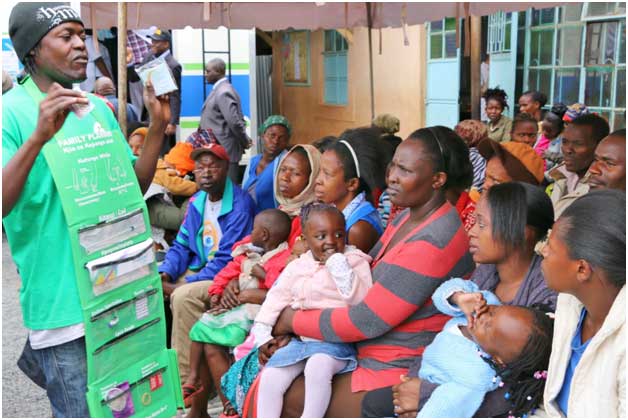The New Cold War Over Access To Safe Abortion in Kenya
Opinion
Community health volunteers inform community members about different methods of family planning. Photo Credit: UNFPA Kenya
Fatuma, a 24-year-old girl from Korogocho (an informal settlement in Nairobi), is the victim. She died from complications due to an unplanned abortion in December 2021. Her friend and some of her neighbors discovered her bleeding profusely and unable move. They rushed her to the hospital. She died before they could get her to the doctor.
Unfortunately, Fatuma’s story is common for girls and women in Kenya. In fact, at most 7 of them are killed each day by complications from unsafe abortion. Worse still, is that with current trends – where 700 girls between the ages of 10 and 19 are getting pregnant daily; the harrowing statistics on abortions are likely to be worse. Fatuma would have survived if she had known where safe abortion services were available.
Despite the Constitution of Kenya allowing safe abortion in three instances, the right of women to decide when and how they want to have children is still a controversial issue. With the judicial branch of the government pushing the law, Kenya has made great strides in promoting reproductive Justice. The following is an example: Malindi case (Petition E009 of 2020)This affirmation reaffirms that abortion is a fundamental human right, as stated in the Constitution.
Additionally, the court outlawed arbitrarily arresting trained healthcare professionals and people seeking safe abortions within Constitutional limits. These gains are being attacked in what Kenyans call the new cold war. The fight between progender and reproductive justice proponents and anti-choice subscriber.
Over the past few decades, a number of events have affected both the legal and social environment for safe, life-saving abortion services. First, there was the arbitrary withdrawal You can find the National Standards and Guidelines for Reducing Maternal Morbidity and Mortality2013. In 2013, the Ministry of Health ceased all training of medical abortion providers a year after they were restored by the High Court.
The Ministry of Health launched the “Healthy People” initiative in July. National Reproductive Health Policy(2022-2032),Unjustified policy that was not enacted in accordance with the Constitution’s Article 118.. This policy does not allow for access to reproductive health for a large section of the population. It requires parental consent, but does not consider unsafe abortions and deaths as a public health problem despite the statistics.
Additionally, consider the sustained attack on women’s health rights by opposition groups led by far-right extremist organization CitizenGO. They pretend to be Christians and work to undermine human rights. They pay hungry, unsuspecting Kenyan youth to trend hashtagsThey deliberately exaggerate lies and half-truths regarding sexual and reproductive rights issues, including abortion, LGBTI+ rights, and sexuality education.
They continue to influence public opinions and regressive laws, policies, and practices around the world, including in Kenya. Ironically, the organization which is headquartered in Madrid, is heavily funded by institutions in and individuals from the global north, yet maintain that sexual and reproductive health and rights is a foreign agenda to Africa – and must be rejected.
CitizenGO has run in the past smear campaigns against reproductive rights. These included Hon. Susan Kihika (former Senator – and now Governor of Nakuru County) for sponsoring the Reproductive Health Bill 2019 in the Senate. This Bill would have provided a much needed legal framework on a wide range of reproductive issues such as assisted reproduction – which continue to operate in a vacuum.
They also have bullied Hon. Esther Passaris used social media to host a Christmas party at work for sex workers. They also trolling Hon. They trolled Hon.
Critics could make religious arguments to support safe abortion and the rights granted to gender minorities. It is important to note that these beliefs can be subjective. Kenya is a secular nation that practices the doctrine church-state separation. This principle creates distance between them, recognizing that religion and morality are subjective.
Besides, the Constitution operates a robust Bill of Rights that are legally binding – and not mere suggestions. Article 43, in addition to expanding the right for safe abortion, provides the right for the highest standard of reproductive healthcare. It also protects privacy and human dignity. CitizenGO, and other similar organizations, must therefore be within the legal framework of the Republic.
These fights can lead to denial of information and services for marginalized communities. However, this fight is more than just about accessing information and services. It’s about unequal power relations. People are giving large sums of money to initiatives that seek to restrict human rights and freedoms. This is a major obstacle to progress in government, media, and other key sectors.
It is crucial that we, as supporters of sexual and reproductive rights, spend time and resources studying the constantly changing strategies and tactics used by opponents to undermine these rights and re-strategize our strategy for the war at stake. We must give priority to movement building and resiliency in reproductive rights. Until then, girls and women in Kenya – and beyond, will continue to die preventable deaths.
Stepanie, a human right lawyer and Senior Fellow at Aspen Institute, is Stepanie. Ritah is Reproductive Health Network’s Youth Project Coordinator, Kenya.
Source: ipsnews
